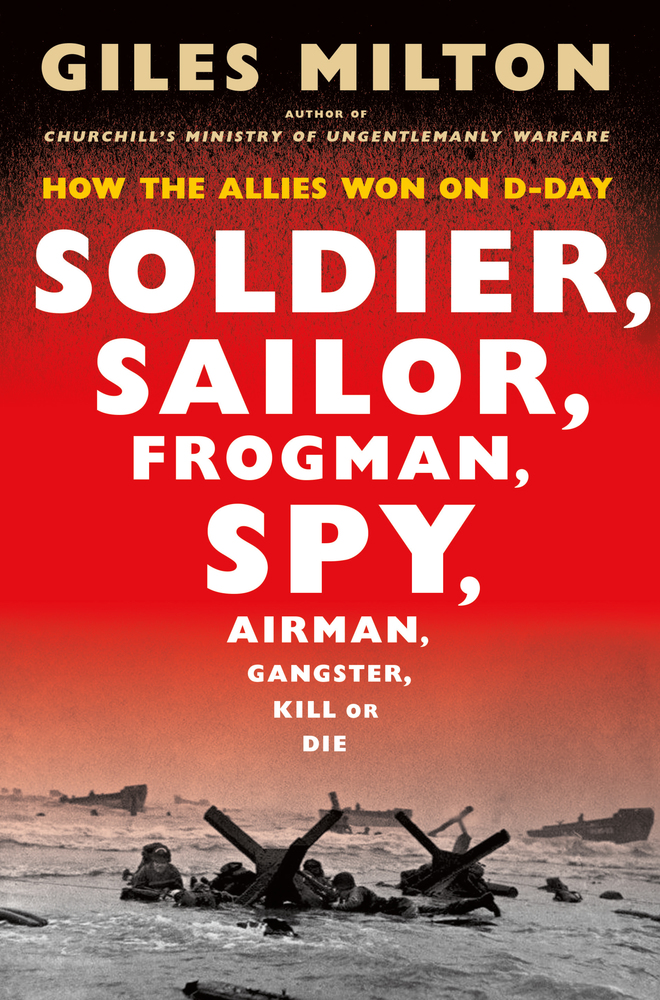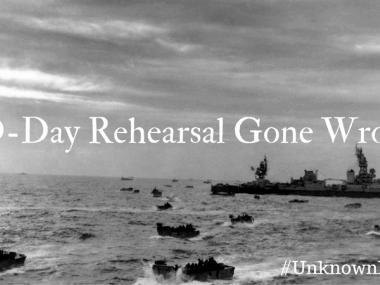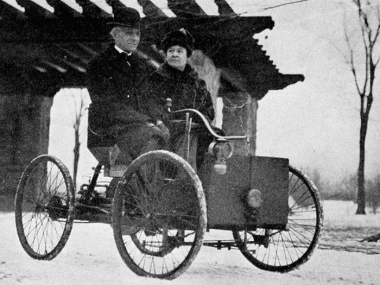D-Day: American Rangers Who Terrified the Germans
A group of American Rangers, led by the bold James Rudder, were some of the strongest and bravest soldiers in D-Day battles. Learn how they sabotaged a giant stockpile of German weapons aimed at Normandy beaches.
Who were William Petty’s Bastards? And why were the Germans so afraid of them? Well—with very good reason. Not for nothing did this band of tough-nut American Rangers refer to themselves as the bastards.
Welcome to Season 3 of Unknown History: D-Day Stories. I’m your host, Giles Milton, and today we’re talking about the mission of the American Rangers to capture the big German guns at Pointe du Hoc.
Buy Now

Pointe du Hoc on the coast of Normandy is a vertical cliff that looms skywards to the height of a nine-story building. From here, there is a spectacular view across the Normandy beaches.
In the spring of 1944, the Germans were quick to realize that if you placed big guns on top of these cliffs, you could cause absolute mayhem by firing down on men attempting to land on those beaches.
To this end, they had installed six 155mm cannon that could lob huge shells a distance of 25,000 meters. They could hit both Utah Beach and Omaha Beach, as well as the cruisers and destroyers at anchor in the coastal waters. It was clear to the Allied planners of D-Day that the big guns of Pointe du Hoc had to be taken out.
But how? And by who?
Cometh the hour, cometh the man. James Rudder was to lead an attack that would be spearheaded by a small band of specially trained Rangers. Theirs was to be no conventional attack. Instead of attacking from the land, as the Germans were expecting, Rudder decided instead to scale the cliffs of Pointe du Hoc and attack the guns head-on.
It was a crazy plan. Bold, daring, and all but impossible. But Rudder felt sure that if he had the right men—and trained them to within an inch of their lives—then he would succeed.
He wanted only the finest men in his battalion and he selected them for their stamina and motivation. His chosen band could come from any walk of life, just so long as they were prepared to fight to the death.
It was a crazy plan. Bold, daring, and all but impossible.
Many of Rudder’s recruits were unruly misfits. Merril Stinnetti was a firebrand who was forever getting into fights. He’d as soon knock you off the bar-stool if you looked him wrong, said one of his mates, Herman Stein. “I was sitting right next to him when he cold-cocked a guy.”
Bill Anderson was another hulk of “downright blood and guts” who had been demoted from sergeant to private after a fist-fight.
William Petty was similarly violent: he soon fell in with a gang of hotheads like himself—Bill Colden, Gene Vershare, Bill Coldsmith, and Bill McHugh. Collectively they were known as Petty’s Bastards. They were determined to prove that they could be bastards—absolute bastards—on the field of battle.
As the men leaped from their landing craft into thigh-deep water, some of them tumbled into craters so deep that they found themselves plunged underwater. Getting ashore was only the first step in a highly dangerous operation. They now had to scale the cliff.
One of the Rangers’ greatest problems in those opening minutes of combat came when their amphibious vehicles were unable to get purchase on the shingle beach. It meant that the 80-foot extending ladders, loaned by the London Fire Brigade and welded securely to the decks, could not reach the cliff-top.
This technical drawback did nothing to deter one of Rudder’s more acrobatic men, William Stivison hoisted one of the ladders vertically into the sky and then scampered to the top. He was completely unfazed by the fact that the ladder was swinging back and forth like a precarious trapeze as the amphibious vehicle bucked and kicked in the heavy swell. In the brief seconds when the ladder was upright, Stivison would straighten his machine gun and “fire short bursts as he passed over the edge of the cliff.”
Seconds later, he would wrap his arms around the rungs of the ladder as it plunged back towards the water.
With the extending ladders out of action, the men were forced to rely on their rope and steel grapnels. These were fired from rocket guns and had been designed to embed themselves into the clifftop and leave a trail of rope dangling down to the beach. That, at least, was the theory. In reality, most of the ropes were too sodden with spray (and therefore too heavy) to reach the cliff-top. Very few of the grapnels buried themselves into the wet clay at the top of Pointe du Hoc.
William Petty was about to scale one of the dangling ropes when a German machine gun began spitting bullets at his comrade halfway up the cliff. “He stiffened and swung out. Next, he slid down the rope like an elevator, bounced several times against ledges” before thumping on to the rocks below.
Petty grabbed the greasy rope and started to climb, praying that the machine-gun fire wouldn’t hit him. The men could easily have been wiped out there and then, but fabulous training and a determination to succeed saw the first few men successfully scale the cliff.
“Let’s go!”
The men could easily have been wiped out there and then, but fabulous training and a determination to succeed saw the first few men successfully scale the cliff.
“I don’t know what to do.”
“Mac, you and Coldsmith take the left flank. Colden, you take the right and move out.”
Petty’s Bastards were soon on the move, hungry for action. Petty himself was keeping a sharp eye on the German positions. “There come seven of the bastards.” They all let rip and watched them drop to the ground. The few Germans they captured alive would live to regret it. “All right, let’s see you bastards goosestep,” yelled one to one small group of captives he was tormenting. “Ein – Zwei – Drei.”
The chewed-up terrain meant it was impossible to undertake a coherent attack and the assault soon broke down into a series of individual fire-fights. Each platoon had been given an objective. Now, even when separated, they tried to fulfil their goal of capturing and securing the clifftop.
James Rudder had established his command post in a crater close to the cliff edge. He had been shot through the leg but refused to let it trouble him. He ordered the medic to run a swab through the hole—excruciatingly painful without anaesthetic—and then sluice some iodine onto the raw flesh.
His men were by now under fire from every direction—and not just from the Germans. When the American ship Texas fired towards the land, one of its fourteen-inch shells landed smack on Rudder’s command post.
One of his men was so seriously injured in the blast that he died soon after. Others were left clutching their heads as they reeled from the shock. Jerking with terror, they found their skin had been dyed bright yellow from the smoke of the colored shell.
William Petty and his team fought their way through the German trenches, clearing them one by one. One of them took a bullet in the throat. “The blood was gushing out of him,” said Herman Stein. He thumped his fist into the gaping hole, “trying to stop the flow of blood, but that high blood pressure of his was pumping like mad.” It took just a couple of minutes for him to die. His eyes “opened in a glassy, far-away look and I knew he was gone.”
When the Rangers finally reached the gun emplacements, they found—to their surprise—that the guns were not there. The Germans had taken them out and hidden them. The hunt was now on to find them. It was essential that the Rangers locate the guns and destroy them.
Among the group that pushed inland, away from the clifftop, was William Petty and his bastards. Petty himself took up position behind a low wall, with a view over a sweep of the main road that ran along the coast. At one point, eight Germans swung by on bicycles. Petty opened up on them.
“Almost like goin’ duck huntin’,” he said with a grin.
Ranger Leonard Lomell was convinced that the Germans had concealed their big guns in order to safeguard them from the Allied aerial bombardment. Now, he and his platoon sergeant, Jack Kahn, decided to scout barns, outhouses, and orchards to see if they could find them.
It wasn’t long before they came across a sunken road with deep track marks in the mud. And then came the jackpot.
“Here they are!” Lomell shouted over to Kahn. He’d chanced upon the very guns they were tasked with destroying. Concealed in an orchard and half camouflaged by trees, they were huge, far bigger than Lomell was expecting. “The wheels went up over our heads. Their muzzles went way up into the air, above our reach.”
Alarmingly, they were all pointing towards Utah Beach, some eight miles away. “Their positions were textbook ready.”
Jack handed over his thermite grenade. It was the perfect weapon for sabotage—totally silent on detonation, yet releasing such a furnace of heat that it would turn steel to liquid.
“You cover me. I’m going in there and destroying them.”
‘You cover me. I’m going in there and destroying them.’
Lomell crawled forward and lodged the thermite grenades into the traversing mechanism of two of the cannons. This would melt them and render them useless. He then smashed the sights on the remaining guns, before signalling to Kahn that they should return to the roadblock and collect the rest of the thermite grenades.
This they duly did. “We stuffed them in our jackets and we rushed back and we put the thermite grenades, as many as we could, in traversing mechanisms and elevation mechanisms.” When they detonated, they turned everything to a gooey mess of molten steel—guns, cranks, hinges, and breechblocks. It was work well done.
“Hurry up, Len!” Kahn was getting increasingly concerned about being spotted by the Germans.
“Hurry up! Hurry up! Let’s get the hell out of here!”
They had just started making their escape when there was an explosion of such staggering force that the blast lifted them from the ground and hurled them into the sunken lane.
“We went flying, and ramrods, rocks, dust and everything came down on us.” Shaking with fear, they picked themselves up and “ran like two scared rabbits as fast as we could back to our men at the roadblock.”
They had just started making their escape when there was an explosion of such staggering force that the blast lifted them from the ground and hurled them into the sunken lane.
They assumed that a nearby ammunition dump had been hit by a stray shell from the Texas. In fact, the explosion was the work of their fellow Rangers. Sergeant Frank Rupinski had stumbled across the dump while looking for the guns, and blown it sky-high with explosive charges. The resulting blast had destroyed absolutely everything, including a sizeable chunk of field.
When James Rudder received word that the guns had been destroyed, he sent a message to the ships offshore. “Located Pointe-du-Hoc—mission accomplished—need ammunition and reinforcements—many casualties.” It was an hour before he received a reply. “No reinforcements available.” All his fellow Rangers had been diverted to Omaha Beach. Rudder’s men were now on their own, surrounded and under siege. Even Petty’s bastards wondered how they would survive the rest of the day.
I hope you enjoyed this episode of Unknown History. In the next episode, we’ll be meeting a colourful British aristocrat who was to play a vital role in the commando landings on Sword Beach.
You May Also Like…






